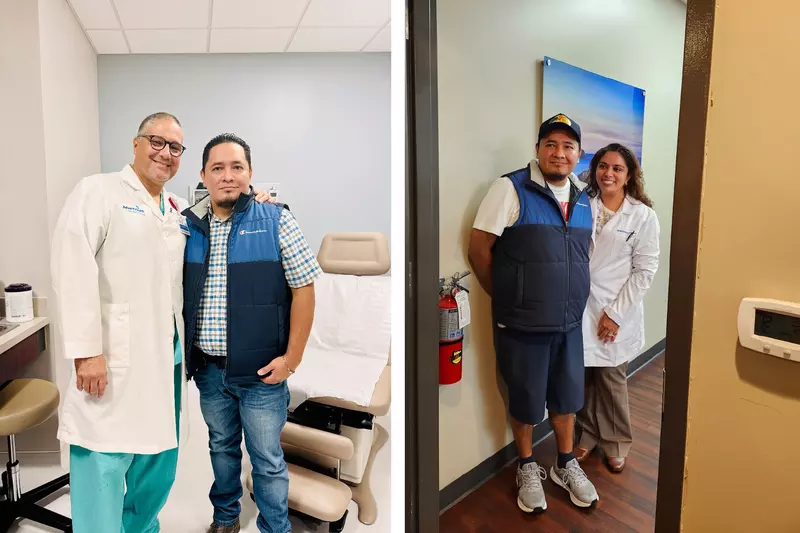- AdventHealth

Choose the health content that’s right for you, and get it delivered right in your inbox.
According to Alfredo Altamirano, his life completely changed in a matter of 15 days two years ago. When Alfredo started feeling severe pain in his abdomen, he went directly to the ER. He had been feeling exhausted and suffered from constipation for many days leading up to his hospital visit.
Alfredo was informed at the hospital that cancerous polyps were found and that the cancer had already spread, so it wasn’t removable. Within a few days, Alfredo underwent surgery with Dr. Norbert Garcia-Henriquez to place a venous access device for treatment.
The father of a son himself, Alfredo, 39, explained that he felt a sense of peace and reassurance after speaking with Dr. Garcia because he made him feel like family, as if he was “a father taking care of his son.”
According to Dr. Garcia, “After receiving chemo, Alfredo started immunotherapy and is currently receiving treatment. His cancer is responding well to the treatment and continues to decrease in size.”
Living Life in the Present Moment
We also spoke to the patient’s oncologist, Sarah George, MD. Dr. George says, “Alfredo had a special marker on molecular testing that wasn’t apparent on initial testing. This allowed him to be treated with immunotherapy. Alfredo recently completed a year of immunotherapy, and all his scans showed no evidence of residual tumor. His cancer disappeared without surgery!”
Alfredo is grateful for the care and help he receives and says that he “trusts in the technology that AdventHealth offers.” He’s now a champion of good life habits, and the impact food has on our health. Alfredo is happy to help raise awareness about the disease, especially among young adults like himself.
Q&A With Sarah George, MD
We also had a chance to speak with oncologist Sarah George, MD, for more information about colorectal cancer and its impact on people of all ages and genders. Here is what Dr. George had to say:
What are updated statistics on how colorectal cancers are impacting Americans, including age groups and genders?
Dr. George: Colorectal cancer is cancer that starts in the colon or rectum. It’s the third most common cancer to be diagnosed in men and women and the second most common cause of cancer-related deaths in men and women combined. According to the American Cancer Society, over 150,000 new cases will be diagnosed this year in the United States, and there will be over 50,000 deaths due to the disease.
New diagnoses are expected to exceed 2 million for the first time, worldwide, this year. In patients younger than 55, rates of newly diagnosed colorectal cancer have been increasing for the last 30 years or so. This is a major reason that the age for screening colonoscopies has been lowered to age 45.
What are colorectal cancer symptoms to watch out for?
Dr. George: People with colorectal cancer can have changes in the stool color (bright red blood, dark and tarry), change in stool size (narrow stools), changes in stool habits (new onset of persistent constipation or diarrhea, loss of bowel control), pain with bowel movements, weight loss, abdominal pain. Symptoms can arise due to blood loss over time and cause iron deficiency anemia, which can lead to weakness and fatigue.
What are steps we can take to prevent colorectal cancer or catch it early enough for effective treatment?
Dr. George: Catching colorectal cancer early is key. This can be done by starting screening by age 45 with sensitive stool tests or colonoscopies. High-risk patients may benefit from screening at earlier ages. Of course, if you have symptoms, don’t wait, even if you think you may be “too young” to have colon cancer — seek the expertise of your physician to get you to the right specialist.
What are factors that increase or decrease colorectal cancer risk?
Dr. George: Risks for developing colorectal cancer include increases in age and weight, decreases in activity, a family or personal history of colorectal cancer or precancerous polyps. Inherited conditions that run in families may cause colorectal cancer. Inflammatory bowel disease or prior radiation treatments of the abdomen or pelvis can also be a risk. Habits, such as inactive lifestyle, smoking and a high-fat diet contribute as well.
What are colorectal cancer treatment options?
Dr. George: Treatment options include surgery, chemotherapy, radiation therapy, targeted therapy or combinations of these. Some patients benefit from immunotherapy in certain circumstances.
What is the outlook for patients with colorectal cancer?
Dr. George: Colorectal cancer 5-year survival rates can exceed 90% if the disease is localized. It’s very important to catch the cancer early, so staying up to date on screening and being aware of and alerting your physician to any cancer symptoms are vital.
Wear Blue for Colorectal Cancer Awareness Month
This March, be sure to wear blue to show your support for patients, families, survivors and those who have lost the valiant battle to colorectal cancer. And now you can do your part to help spread awareness so that together, we can help slow the prevalence rate of these life-altering diseases.
Thank you to our clinical team for all you do for your brave patients, like Alfredo Altamirano, every day. Visit us to get screened today so you can stay healthy in body, mind and spirit.



